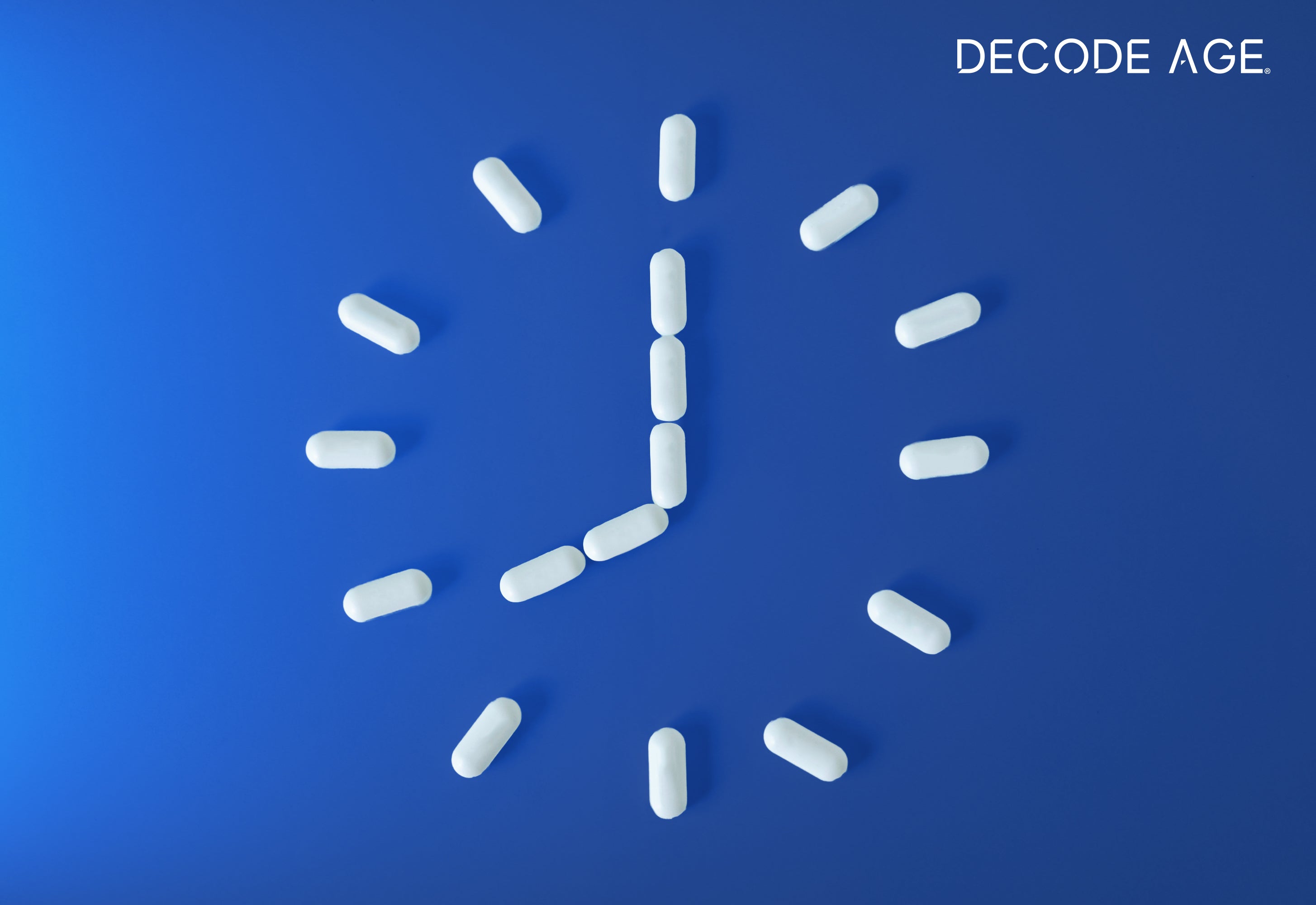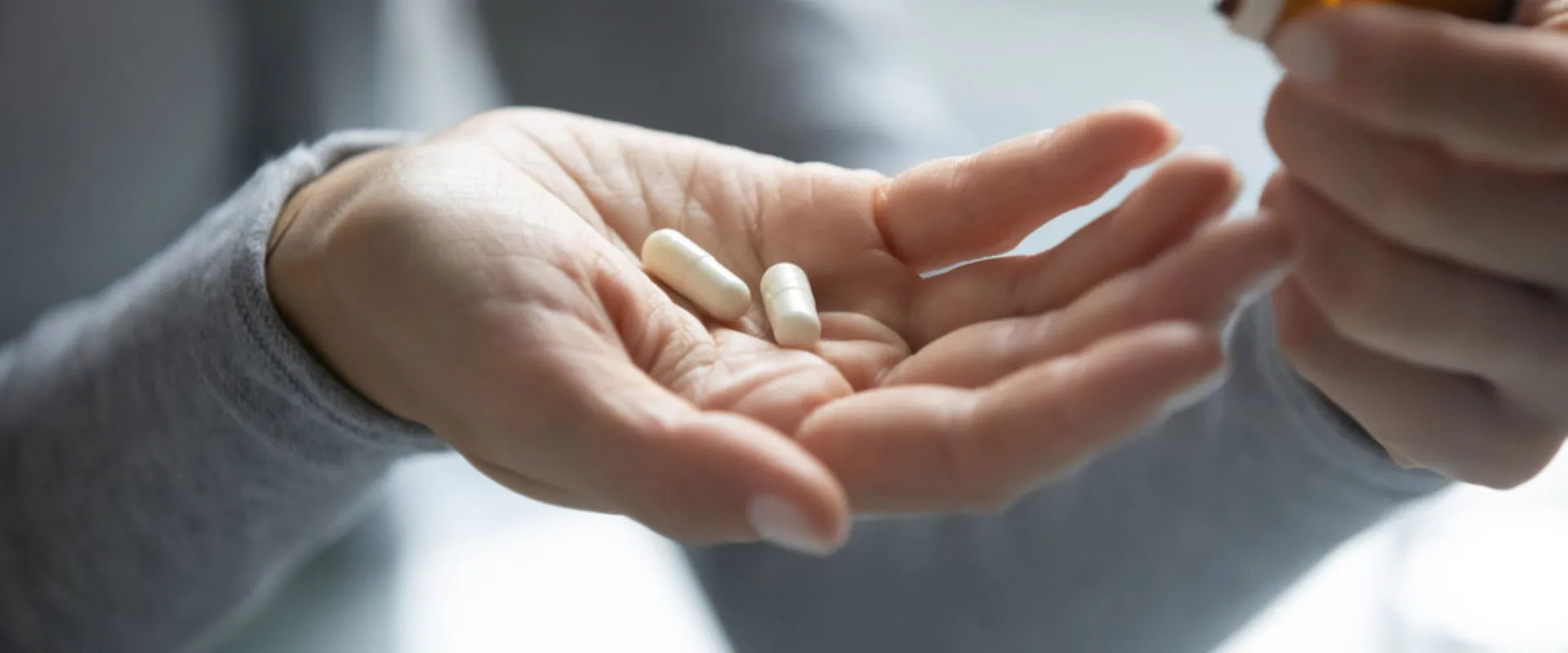Ageing is inevitable, but premature ageing is not. Science now understands ageing not as a simple countdown, but as a process affected by cellular health, inflammation, nutrient availability, and lifestyle choices.
A good anti-ageing supplements don’t promise eternal youth, but they do offer a way to:
- Support cellular energy
- Protect against oxidative stress
- Boost skin, joint, and brain health
- Maintain metabolic resilience
In this guide, we explore the top anti-ageing supplements for longevity, skin health, and vitality. From compounds like NMN and spermidine to time-tested nutrients like vitamin D and omega-3s.
Best Anti-ageing Supplements
NMN (Nicotinamide Mononucleotide)
NMN is one of the most researched longevity molecules right now. It works by boosting NAD+ (nicotinamide adenine dinucleotide) levels, a coenzyme involved in everything from energy production in your mitochondria to DNA repair and cellular signaling.
As NAD+ declines with age, cells lose efficiency in converting food into usable energy, repairing damaged DNA, and maintaining proper circadian rhythms. NMN supplementation has been shown to improve muscle strength, insulin sensitivity, and endurance.
It’s often paired with resveratrol because NMN supplies NAD+, while resveratrol activates sirtuins that depend on NAD+ to function.
Read more: NAD+ vs NMN: Which Supplement Best Supports Healthy Ageing?
Best Times to Take NMN and Resveratrol
Interesting Facts:
- NAD+ decline starts as early as our 20s. The levels can drop by up to 65% by the age of 70.
- NAD+ is the second most abundant molecule in your body after water.
- You will have to eat 8 tonnes of Avocado for 1000mg of NMN
- You’d need to eat more than 13kg of edamame to get the same amount of NMN in just one capsule of NMN 250!
Common Myths:
- NMN is only for the elderly.
- Taking NMN means you can skip exercise.
Read more: Do Supplements Like NMN Actually Work? Debunking Myths With Research
Resveratrol
Resveratrol is a plant polyphenol famous for its role in the “French Paradox”, the observation that the French have relatively low rates of heart disease despite diets high in saturated fats, possibly due to red wine’s resveratrol content.
Resveratrol is known for activating sirtuins (longevity-related proteins) and promoting mitochondrial biogenesis, meaning it helps your body create more mitochondria (energy factories) inside cells. It also reduces oxidative stress and inflammation, both of which accelerate ageing.
Read more: What is Resveratrol? Why is it beneficial?
Interesting Facts:
- The absorption of Resveratrol can be improved when taken with fats, like olive oil.
- It has been studied for its potential to mimic calorie restriction benefits without actual dieting.
- To get 100 mg of trans-resveratrol, you must consume about 8 to 10 kilograms of grapes.
- In mice, Resveratrol can increase lifespan by 25%.
- In round worms and fruit flies, Resveratrol can increase lifespan by 10%.
Common Myths:
- A glass of wine a day gives you enough resveratrol. (You’d need ~1000 glasses to match the therapeutic/supplement dose)
Spermidine
Spermidine is a naturally occurring polyamine that triggers autophagy, your body’s internal recycling program that clears out damaged proteins and organelles.
With age, autophagy slows down, leading to accumulation of cellular debris (waste). By stimulating this process, spermidine supports brain health, cardiovascular function, and potentially extends lifespan (shown in animal studies).
Interesting Facts:
- Spermidine was first discovered in semen. Hence, it got its name “Spermidine”
- Spermine can be synthesized by our intestinal bacteria.
- Consuming 1.3 kg of wheat germ can give you 500mg of spermidine.
Common Myths:
- Spermidine is only for skin and hair health.
Read more: Will Spermidine Really Help with Longevity and Combat Ageing?
Fisetin
Fisetin is a senolytic, meaning it helps clear out senescent cells, which are damaged “zombie” cells that refuse to die and secrete inflammatory chemicals. These cells accumulate with age and contribute to age-related diseases. Fisetin also has antioxidant and anti-inflammatory properties.
Interesting Facts:
- Strawberries have the highest natural fisetin content, but you need to eat 625 grams of strawberries to get 100 mg of fisetin.
Common Myths:
- “More is always better” (high doses of fisetin. i.e., 1000mg should be cycled and not to be taken daily)
Ca-AKG (Calcium Alpha-Ketoglutarate)
Ca-AKG is a form of alpha-ketoglutarate, a compound in the Krebs cycle, the core energy-producing process of our cells. It influences longevity pathways by reducing inflammation and maintaining healthy mitochondrial function.
A study found Ca-AKG supplementation reduced biological age in humans by an average of 8 years (based on DNA methylation biomarkers). It’s also used to improve recovery after physical exertion.
Interesting Facts:
- AKG naturally drops by 10-fold between early adulthood and old age.
Common Myths:
- It’s only for athletes
Magnesium
Magnesium is vital for over 300 enzymatic reactions, impacting nerve function, muscle contraction, heart rhythm, and even DNA repair.
It plays a role in regulating blood sugar, supporting bone health, and improving sleep quality, all essential for slowing biological ageing. Magnesium deficiency can mimic symptoms of accelerated ageing, such as fatigue, muscle weakness, and cognitive decline.
Interesting Facts:
- Around half of the population doesn’t get the recommended daily intake of magnesium.
- The daily body requirement of magnesium is 310-420 mg.
Common Myths:
- All magnesium forms work the same.
- It’s only helpful in preventing cramps.
Read more: 7 Forms of Magnesium You Need to Know About
Vitamin D + K2
Vitamin D, the “sunshine vitamin” helps with calcium absorption, immune function, and mood regulation, while K2 ensures that calcium is deposited into bones rather than arteries.
Together, they reduce the risk of osteoporosis, cardiovascular disease, and age-related frailty. Research also links optimal vitamin D levels with improved longevity and reduced risk of chronic illnesses.
Interesting Facts:
- Vitamin D is technically a hormone, not just a vitamin.
- The D2 (ergocalciferol) form of vitamin D is from plant source and D3 (cholecalciferol) comes from animal sources and sunlight.
- Vitamin K is required for the absorption of Vitamin D.
- Vitamin K exists in two main forms: K1 (phylloquinone) and K2 (menaquinone).
- K1 is found primarily in green leafy vegetables, and K2 in fermented foods and animal products.
- K2 can also be produced by gut bacteria.
- K2 (especially MK-7 form) stays in the body longer and is more effective at calcium management.
Common Myths:
- Sun exposure guarantees adequate vitamin D. (It depends on location, skin tone, and season)
Omega-3 Fatty Acids
Omega-3s, particularly EPA and DHA, are anti-inflammatory fats crucial for brain health, heart function, and joint mobility.
They help maintain flexible cell membranes, improve blood lipid profiles, and support mood regulation. Higher omega-3 blood levels have been linked to reduced biological ageing markers.
Interesting Facts:
- Algae oil is a plant-based source of EPA and DHA, ideal for vegetarians.
- Omega-3s may help preserve telomere length, a marker of cellular ageing.
Common Myths:
- Omega-3 supplements make you gain weight.
- Flaxseed oil provides the same benefits as fish oil (ALA from flaxseed is poorly converted to EPA/DHA)
Collagen Peptides
Collagen is the main structural protein in your skin, tendons, and cartilage. Nut the production of collagen drops after your mid-20s, leading to wrinkles, sagging skin, and weaker joints, making supplementation necessary.
Supplementing with hydrolysed collagen peptides can be beneficial as they are easily absorbed and can improve skin elasticity, hydration, and nail strength.
Interesting Facts:
- In clinical trials, daily collagen peptides improved skin hydration and reduced wrinkles within 12 weeks.
- Vitamin C boosts collagen synthesis, so pairing them is ideal.
Common Myths:
- Topical collagen creams replace lost collagen. (collagen molecules are too large to penetrate skin)
FAQs
Are anti-ageing supplements safe for everyone?
Most anti-ageing supplements are safe when taken within recommended doses, but safety depends on your age, health status, and any medications you may be taking. It’s always best to consult a healthcare professional before starting, especially if you have chronic conditions.
Can I take multiple anti-ageing supplements together?
Yes, many supplements work synergistically when combined. For example, NMN and resveratrol enhance each other’s effects, while vitamin D and K2 work together for bone and cardiovascular health. However, it’s important not to over-supplement, as too much of a nutrient can be harmful. Ideally, you should personalise your stack based on lab tests or professional advice to avoid overlaps and ensure maximum benefit.
Do I need anti-ageing supplements even if I eat a healthy diet?
A balanced diet is essential, but it may not be enough as we age. Nutrient absorption declines over time, and certain compounds like NMN, spermidine, or fisetin aren’t available in meaningful amounts from food alone. Supplements help bridge these gaps by providing therapeutic doses. So, while diet should always come first, well-chosen anti-ageing supplements can optimise your healthspan and slow down biological ageing.
What is the best age to start anti-ageing supplements?
There’s no “perfect” age, but most experts recommend starting anti-ageing supplements in your late 20s to early 30s, when natural declines in collagen, NAD+, and mitochondrial efficiency begin. Early use supports prevention rather than correction. For example, NMN or resveratrol can help maintain cellular energy early, while collagen peptides can slow visible skin ageing. The sooner you build healthy habits, the greater the long-term impact.

























1 comment
Sourabh Mahapatro
hi i need guidance on supplements. i am 38 male with no disease with no alochol and smoking habits. i regulaary got gym and do moderate intense cardio daily. i need supplements fo longevity a
and high energy and fitness levels throughout day post my work out. please suggest me right supplements for longervity and overall high fitness.
Leave a comment
All comments are moderated before being published.
This site is protected by hCaptcha and the hCaptcha Privacy Policy and Terms of Service apply.